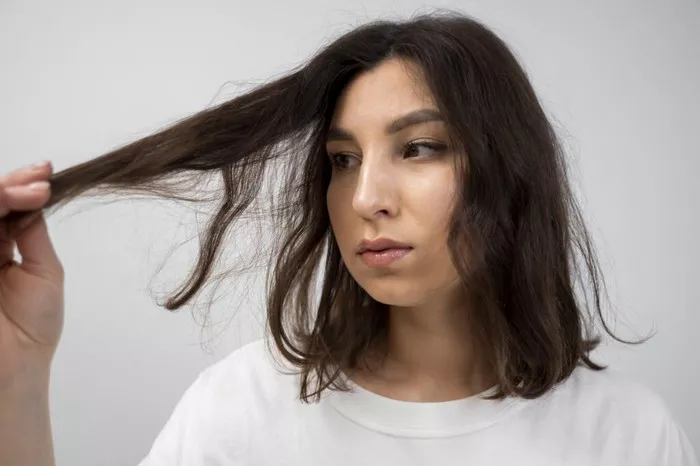Hair thinning is a common concern that affects millions of people worldwide. If you’ve noticed your hair becoming thinner, you’re likely wondering, “Why is this happening?” The answer isn’t always simple, as hair thinning can result from a mix of genetics, lifestyle choices, health conditions, and environmental factors. In this article, we’ll break down the most common causes of hair thinning using simple, easy-to-understand language.
By the end, you’ll have a clearer picture of what might be affecting your hair and what steps you can take next.
Genetics: The Most Common Culrit
Your genes play a huge role in hair thickness. If your parents or grandparents had thin hair, you might inherit the same trait. This type of hair loss is called androgenetic alopecia (male or female pattern baldness).
How It Works: A hormone called dihydrotestosterone (DHT) shrinks hair follicles over time, leading to shorter, finer hairs. Eventually, follicles stop producing hair altogether.
Patterns:
- Men: Receding hairline, thinning at the crown.
- Women: Overall thinning, especially around the part line.
Age: Can start as early as your 20s.
While you can’t change your genes, treatments like minoxidil (Rogaine) or finasteride (Propecia) may slow down thinning.
Hormonal Changes: Messing With Your Balance
Hormones regulate hair growth cycles. When they’re out of balance, hair thinning often follows.
- Thyroid Issues: Both hypothyroidism (low thyroid hormones) and hyperthyroidism (high thyroid hormones) can cause hair loss.
- Pregnancy/Childbirth: Hormone shifts during pregnancy make hair thicker, but many women shed hair postpartum as hormones normalize.
- Menopause: Dropping estrogen levels lead to thinner, drier hair.
- PCOS: Polycystic ovary syndrome increases androgens (male hormones), causing scalp hair loss and facial hair growth.
Blood tests can check hormone levels. Treatments include thyroid medication, hormone replacement therapy (HRT), or anti-androgen drugs.
Medical Conditions: Underlying Health Problems
Certain illnesses directly impact hair health.
- Alopecia Areata: An autoimmune disease where the body attacks hair follicles, causing patchy hair loss.
- Scalp Infections: Fungal infections (like ringworm) or bacterial issues inflame follicles, leading to hair fall.
- Chronic Illnesses: Diabetes, lupus, or kidney disease can disrupt hair growth.
- Recovery From Surgery/Illness: Physical stress from major health events often triggers temporary hair shedding.
Treating the underlying condition usually improves hair thinning. For example, antifungal creams clear scalp infections, while immunosuppressants help alopecia.
Nutritional Deficiencies: Your Diet Matters
Hair needs nutrients to grow. Poor eating habits or restrictive diets deprive follicles of these essentials.
Iron: Low iron (common in women with heavy periods) reduces oxygen supply to hair follicles.
Protein: Hair is made of keratin, a protein. Too little protein weakens hair structure.
Vitamins:
- Biotin (B7): Deficiency causes brittle hair.
- Vitamin D: Low levels link to alopecia.
- Zinc: Supports follicle repair.
Crash Dieting: Rapid weight loss shocks the body, pushing hair into a shedding phase.
A blood test can spot deficiencies. Fixing your diet or taking supplements often reverses thinning.
Stress: Physical or Emotional
Stress is a sneaky cause of hair loss. It triggers telogen effluvium, where hair prematurely enters the resting phase and falls out 2–3 months later.
- Physical Stress: Surgery, illness, or extreme weight loss.
- Emotional Stress: Divorce, grief, or work pressure.
- COVID-19: Many report hair shedding post-infection due to fever/stress.
Stress-related thinning is usually temporary. Managing stress through therapy, exercise, or meditation helps hair regrow.
Medications: Side Effects
Some prescription drugs list hair loss as a side effect.
- Chemotherapy: Targets fast-growing cells (including hair follicles), causing rapid shedding.
- Blood Thinners: Heparin or warfarin.
- Antidepressants: Prozac, Zoloft.
- Acne Medications: Isotretinoin (Accutane).
- Birth Control Pills: Hormonal changes may trigger thinning in some women.
Never stop medication without consulting your doctor. They may adjust your dose or switch prescriptions.
Aging: Natural Thinning
As you age, hair growth slows, and strands become finer.
- Reduced Follicle Size: Follicles shrink, producing thinner hairs.
- Gray Hair: Coarser gray hairs can make thinning more noticeable.
While aging is inevitable, gentle hair care and volumizing products can create the illusion of thicker hair.
Hairstyling Habits: Damage Over Time
Your styling routine might be harming your hair.
- Heat Tools: Flat irons, blow-dryers, or curlers weaken hair, causing breakage.
- Tight Hairstyles: Ponytails, braids, or extensions pull on follicles, leading to traction alopecia.
- Chemical Treatments: Bleaching, perming, or relaxing damages the hair shaft and scalp.
Limit heat use, avoid tight styles, and space out chemical treatments. Use heat protectant sprays and deep conditioners.
Environmental Factors: Pollution and Climate
External factors can degrade hair health.
- Pollution: Dust and toxins cling to the scalp, causing inflammation.
- UV Exposure: Sunlight weakens hair proteins, making strands brittle.
- Hard Water: Mineral buildup from hard water dries out hair.
Wear hats outdoors, rinse hair after swimming, and use clarifying shampoos to remove buildup.
Autoimmune Diseases: Body vs. Hair
Conditions like lupus or Hashimoto’s thyroiditis confuse the immune system, attacking healthy cells—including hair follicles. Treatment focuses on managing the autoimmune response.
Other Factors
- Smoking: Reduces blood flow to the scalp.
- Alcohol: Dehydrates hair and depletes nutrients.
- Rapid Weight Loss: Shocks the system, triggering shedding.
What Can You Do?
- See a Dermatologist: They’ll diagnose the cause via blood tests or scalp biopsies.
- Adjust Your Diet: Focus on iron, protein, and vitamins.
- Try Topical Treatments: Minoxidil or rosemary oil.
- Be Gentle: Avoid tight hairstyles and excessive heat.
- Manage Stress: Prioritize sleep and relaxation.
Conclusion
Hair thinning is rarely due to just one factor. Genetics, health, and lifestyle often combine to affect your hair. While some causes are beyond your control (like aging or genes), many can be improved with the right care. Don’t panic—most thinning is treatable! Stay patient, consult a professional, and take steps to nurture your hair back to health.
Related topics:
5 Effective Ways to Stop Hair Thinning from PCOS
Hair Thinning: Causes & Solutions for Healthier Hair
Can Hair Thinning Be Reversed? A Full Analysis


